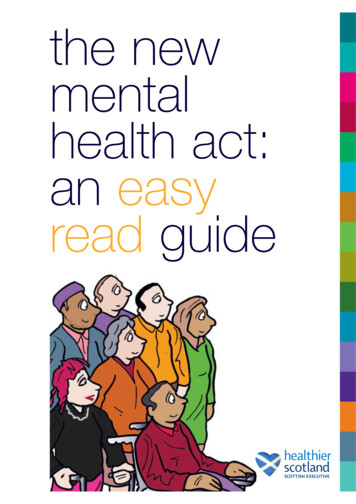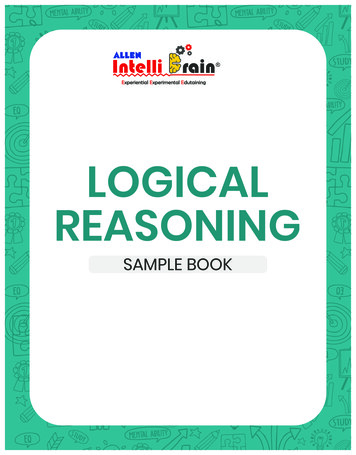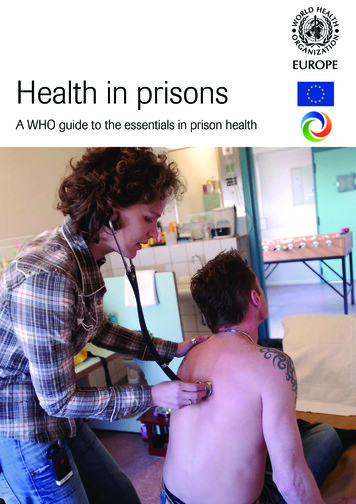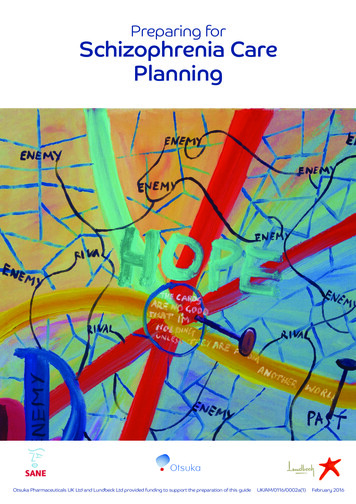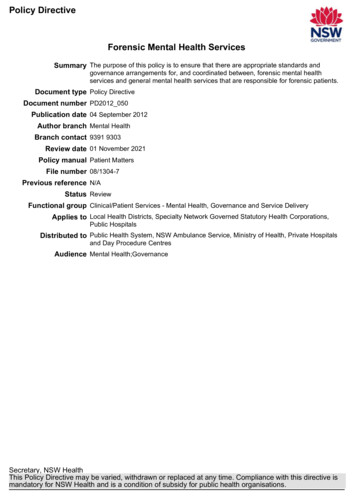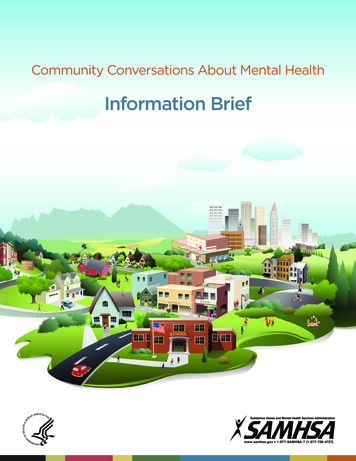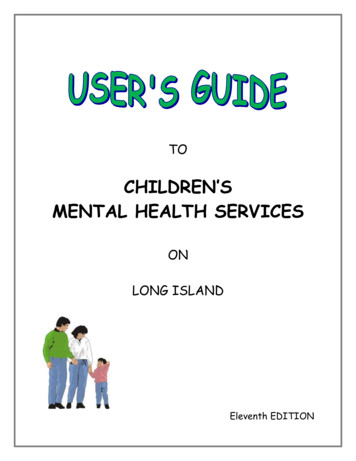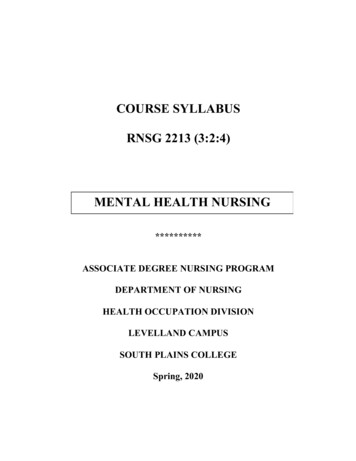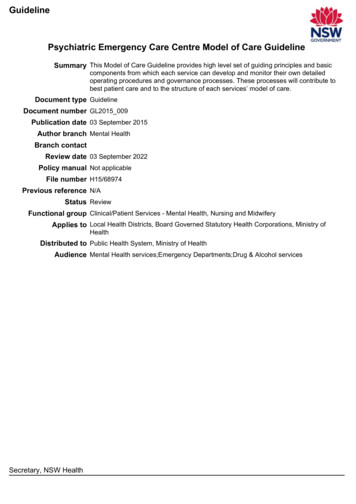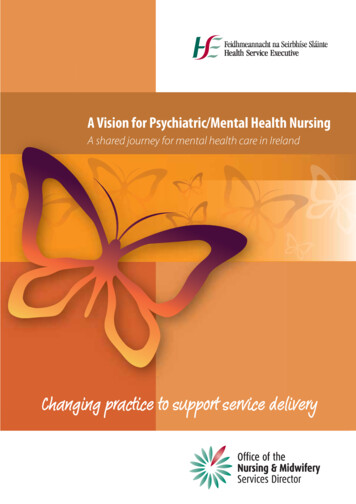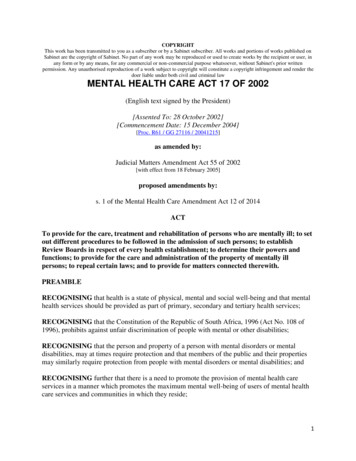
Transcription
COPYRIGHTThis work has been transmitted to you as a subscriber or by a Sabinet subscriber. All works and portions of works published onSabinet are the copyright of Sabinet. No part of any work may be reproduced or used to create works by the recipient or user, inany form or by any means, for any commercial or non-commercial purpose whatsoever, without Sabinet's prior writtenpermission. Any unauthorised reproduction of a work subject to copyright will constitute a copyright infringement and render thedoer liable under both civil and criminal lawMENTAL HEALTH CARE ACT 17 OF 2002(English text signed by the President)[Assented To: 28 October 2002][Commencement Date: 15 December 2004][Proc. R61 / GG 27116 / 20041215]as amended by:Judicial Matters Amendment Act 55 of 2002[with effect from 18 February 2005]proposed amendments by:s. 1 of the Mental Health Care Amendment Act 12 of 2014ACTTo provide for the care, treatment and rehabilitation of persons who are mentally ill; to setout different procedures to be followed in the admission of such persons; to establishReview Boards in respect of every health establishment; to determine their powers andfunctions; to provide for the care and administration of the property of mentally illpersons; to repeal certain laws; and to provide for matters connected therewith.PREAMBLERECOGNISING that health is a state of physical, mental and social well-being and that mentalhealth services should be provided as part of primary, secondary and tertiary health services;RECOGNISING that the Constitution of the Republic of South Africa, 1996 (Act No. 108 of1996), prohibits against unfair discrimination of people with mental or other disabilities;RECOGNISING that the person and property of a person with mental disorders or mentaldisabilities, may at times require protection and that members of the public and their propertiesmay similarly require protection from people with mental disorders or mental disabilities; andRECOGNISING further that there is a need to promote the provision of mental health careservices in a manner which promotes the maximum mental well-being of users of mental healthcare services and communities in which they reside;1
BE IT THEREFORE ENACTED by the Parliament of the Republic of South Africa, asfollows:TABLE OF CONTENTSCHAPTER IINTRODUCTION1.2.DefinitionsInterpretationCHAPTER IIFUNDAMENTAL PROVISIONS3.4.5.Objects of ActImplementation of policies and measures by StateDesignation of health establishments administered under the auspices of State aspsychiatric hospitals or as care and rehabilitation centres6.Provision of mental health care, treatment and rehabilitation services at healthestablishmentsCHAPTER IIIRIGHTS AND DUTIES RELATING TO MENTAL HEALTH CARE USERS7.Application of chapter8.Respect, human dignity and privacy9.Consent to care, treatment and rehabilitation and admission to healthestablishments10.Unfair discrimination11.Exploitation and abuse12.Determinations concerning mental health status13.Disclosure of information14.Limitation on intimate adult relationships15.Right to representation16.Discharge reports17.Knowledge of rightsCHAPTER IVMENTAL HEALTH REVIEW BOARDS18.19.20.21.22.23.EstablishmentPowers and functions of Review BoardComposition of Review BoardRemovalVacanciesRemuneration2
24.Procedures of Review BoardCHAPTER VVOLUNTARY, ASSISTED AND INVOLUNTARY MENTAL HEALTH 0.Voluntary care, treatment and rehabilitation servicesCare, treatment and rehabilitation for mental health care users incapable of makinginformed decisionsApplication for assisted care, treatment and rehabilitation servicesInitial review of assisted mental health care user by Review BoardAppeal against decision of head of health establishment to approve application for assistedcare, treatment and rehabilitationPeriodic review and annual reports on assisted health care usersRecovery of capacity of assisted mental health care users to make informed decisionsCare, treatment and rehabilitation of mental health care users without consentApplication to obtain involuntary care, treatment and rehabilitation2-Hour assessment and subsequent provision of further involuntary care, treatment andrehabilitationAppeal against decision of head of health establishment on involuntary care, treatment andrehabilitationJudicial review of need for further involuntary care, treatment and rehabilitation servicesPeriodic review and annual reports on involuntary mental health care usersRecovery of capacity of involuntary mental health care users to make informed decisionsTransfer of mental health care users to maximum security facilitiesIntervention by members of South African Police ServiceCHAPTER VISTATE PATIENTS41.42.43.44.45.46.47.48.Designation of health establishments for State patientsAdmission of State patients to designated health establishmentsTransfer of State patients between designated health establishmentsState patients who abscondLeave of absence from designated health establishmentsPeriodic review of mental health status of State patientsApplication for discharge of State patientsConditional discharge of State patients, amendments to conditions or revocation ofconditional dischargeCHAPTER VIIMENTALLY ILL PRISONERS49.50.51.52.Designation of health establishments for prisoners who are mentally illEnquiry into the mental health status of prisonerCare, treatment and rehabilitation of prisoners with mental illnesses in prisonMagisterial enquiry concerning transfer to designated health establishments3
53.54.55.56.57.58.Procedure to transfer mentally ill prisoners to designated health establishmentsTransfer of mentally ill prisoners between designated health establishmentsPeriodic reviews of mental health status of mentally ill prisonersRecovery of mental health status of mentally ill prisonersMentally ill prisoners who abscond from health establishmentsProcedure on expiry of term of imprisonment of mentally ill prisonersCHAPTER VIIICARE AND ADMINISTRATION OF PROPERTY OF MENTALLY ILL PERSON ORPERSON WITH SEVERE OR PROFOUND INTELLECTUAL DISABILITY59.60.61.62.63.64.65.Appointment of administrator for care and administration of property of mentally ill personor person with severe or profound intellectual disabilityApplication to Master of High Court for appointment of administratorRecommendation to appoint administrator by High Court during an enquiry or in course oflegal proceedingConfirmation of appointment of administratorPowers, functions and duties of administrators and miscellaneous provisions relating toappointment of administratorsTermination of administratorAdministration of property of mentally ill minors or minors with severe or profoundintellectual disabilityCHAPTER IXREGULATIONS66.67.68.69.RegulationsContent of regulationsProcedure for making regulationsConditions and exemptions contained in regulationsCHAPTER XGENERAL PROVISIONS70.71.72.72A.73.74.75.Offences and penaltiesEstablishment of advisory or technical committeesDelegation and assignment of powers and agreementsDelegation of powersRepeal of lawsTransitional arrangementsShort title and commencementSCHEDULE - LAWS REPEALED BY THIS ACTCHAPTER I4
INTRODUCTION1.DefinitionsIn this Act, unless the context indicates otherwise(i)“administrator” means a person appointed in terms of section 59 to care for andadminister the property of a mentally ill person and where applicable includes aninterim administrator;(ii) “assisted care, treatment and rehabilitation” means the provision of healthinterventions to people incapable of making informed decisions due to their mentalhealth status and who do not refuse the health interventions and “assisted care,treatment and rehabilitation services” has a corresponding meaning;(iii) “assisted mental health care user” means a person receiving assisted care,treatment and rehabilitation;(iv) “associate” means a person with a substantial or material interest in the well-beingof a mental health care user or a person who is in substantial contact with the user;(v)“care and rehabilitation centres” means health establishments for the care,treatment and rehabilitation of people with intellectual disabilities;(vi) “Constitution” means the Constitution of the Republic of South Africa, 1996 (ActNo. 108 of 1996);(vii) “Correctional Services Act” means the Correctional Services Act, 1998 (Act No.111 of 1998);(viii) “court” means a court of law;(ix) “Criminal Procedure Act” means the Criminal Procedure Act, 1977 (Act No. 51 of1977);(x)“head of a health establishment” means a person who manages the establishmentconcerned;(xi) “health care provider” means a person providing health care services;(xii) “health establishment” means institutions, facilities, buildings or places wherepersons receive care, treatment, rehabilitative assistance, diagnostic or therapeuticinterventions or other health services and includes facilities such as communityhealth and rehabilitation centres, clinics, hospitals and psychiatric hospitals;5
(xiii) “involuntary care, treatment and rehabilitation” means the provision of healthinterventions to people incapable of making informed decisions due to their mentalhealth status and who refuse health intervention but require such services for theirown protection or for the protection of others and “involuntary care, treatment andrehabilitation services” has a corresponding meaning;(xiv) “involuntary mental health care user” means a person receiving involuntary care,treatment and rehabilitation;(xv) “Health Professions Act” means Health Professions Act, 1974 (Act No. 56 of1974);(xvi) “medical practitioner” means a person registered as such in terms of the HealthProfessions Act;(xvii) “mental health care practitioner” means a psychiatrist or registered medicalpractitioner or a nurse, occupational therapist, psychologist or social worker who hasbeen trained to provide prescribed mental health care, treatment and rehabilitationservices;(xviii) “mental health care provider” means a person providing mental health careservices to mental health care users and includes mental health care practitioners;(xix) “mental health care user” means a person receiving care, treatment andrehabilitation services or using a health service at a health establishment aimed atenhancing the mental health status of a user, State patient and mentally ill prisonerand where the person concerned is below the age of 18 years or is incapable of takingdecisions, and in certain circumstances may include(i)prospective user;(ii)the person’s next of kin;(iii) a person authorised by any other law or court order to act on that personsbehalf;(iv)(v)an administrator appointed in terms of this Act; andan executor of that deceased person’s estate and “user” has a correspondingmeaning;(xx) “mental health status” means the level of mental well-being of an individual asaffected by physical, social and psychological factors and which may result in apsychiatric diagnosis;6
(xxi) “mental illness” means a positive diagnosis of a mental health related illness interms of accepted diagnostic criteria made by a mental health care practitionerauthorised to make such diagnosis;(xxii) “mentally ill prisoner” means a prisoner as defined in section 1 of the CorrectionalServices Act in respect of whom an order has been issued in terms of section 52(3)(a)to enable the provision of care, treatment and rehabilitation services at a healthestablishment designated in terms of section 49;(xxiii) “Minister” means a Minister responsible for Health;(xxiv) “national department” means the National Department of Health services withinthe national sphere of government;(xxv) “official curator ad litem” means the Director of Public Prosecutions of aprovince in whose jurisdiction the State patient is detained;(xxvi) “prescribed” means prescribed by regulation;(xxvii) “prison” means a prison as defined in section 1 of the Correctional Services Act;(xxviii) “property”, for purposes of Chapter VIII, includes income, finance, business orundertaking;(xxix) “provincial department” means the department responsible for rendering healthservices within the provincial sphere of government;(xxx) “psychiatric hospital” means a health establishment that provides care, treatmentand rehabilitation services only for users with mental illness;(xxxi) “psychiatrist” means a person registered as such in terms of the Health ProfessionsAct;(xxxii) “psychologist” means a person registered as such in terms of the HealthProfessions Act;(xxxiii) “rehabilitation” means a process that facilitates an individual attaining an optimallevel of independent functioning;(xxxiv) “relevant member of the Executive Council” means a member of the ExecutiveCouncil responsible for health in a province;(xxxv) “Review Board” means Mental Health Review Board established in terms ofsection 18;7
(xxxvi) “severe or profound intellectual disability” means a range of intellectualfunctioning extending from partial self-maintenance under close supervision,together with limited self-protection skills in a controlled environment throughlimited self care and requiring constant aid and supervision, to severely restrictedsensory and motor functioning and requiring nursing care;(xxxvii) ”social worker” means a person registered as such in terms of the Social ServicesProfessions Act, 1978 (Act No. 110 of 1978);(xxxviii) ”State patient” means a person so classified by a court directive in terms ofsection 77(6)(a)(i) or 78(6)(i)(aa) of the Criminal Procedure Act;[Definition of “State patient” substituted by s. 19 of Act 55/2002](xxxxix) ”this Act” includes the regulations;(xi) “voluntary care, treatment and rehabilitation” means the provision of healthinterventions to a person who gives consent to such interventions.2.Interpretation(1)This Act must be interpreted in a manner that is consistent with the objectives of thisAct.(2)In the event of any conflict arising between this Act and any other law other than theConstitution, this Act must prevail.CHAPTER IIFUNDAMENTAL PROVISIONS3.Objects of ActThe objects of this Act are to(a)regulate the mental health care in a manner that(i)makes the best possible mental health care, treatment and rehabilitationservices available to the population equitably, efficiently and in the bestinterest of mental health care users within the limits of the available resources;(ii)co-ordinates access to mental health care, treatment and rehabilitation servicesto various categories of mental health care users; and(iii) integrates the provision of mental health care services into the general healthservices environment;8
(b)regulate access to and provide mental health care, treatment and rehabilitationservices to(i)voluntary, assisted and involuntary mental health care users;(ii)State patients; and(iii) mentally ill prisoners;(c)clarify the rights and obligations of mental health care users and the obligations ofmental health care providers; and(d)regulate the manner in which the property of persons with mental illness and personswith severe or profound intellectual disability may be dealt with by a court of law.4.Implementation of policies and measures by StateEvery organ of State responsible for health services must determine and co-ordinate theimplementation of its policies and measures in a manner that-5.(a)ensures the provision of mental health care, treatment and rehabilitation services atprimary, secondary and tertiary levels and health establishments referred to in section5(1);(b)promotes the provision of community-based care, treatment and rehabilitationservices;(c)promotes the rights and interests of mental health care users; and(d)promotes and improves the mental health status of the population.Designation of health establishments administered under the auspices of State aspsychiatric hospitals or as care and rehabilitation centres(1)(2)The head of the national department must, with the concurrence of the head of therelevant provincial department within 120 days of the commencement of this Act,designate health establishments or part of a health establishment which must serveas(a)psychiatric hospitals; or(b)care and rehabilitation centres.A designation referred to in subsection (1) may at any time be revoked or varied bythe head of the national department with the concurrence of the head of the relevantprovincial department.9
6.Provision of mental health care, treatment and rehabilitation services at healthestablishments(1)Health establishments must (a)provide any person requiring mental health care, treatment and rehabilitationservices with the appropriate level of mental health care, treatment andrehabilitation services within its professional scope of practice; or(b)refer such person, according to established referral and admission routes, to ahealth establishment that provides the appropriate level of mental care,treatment and rehabilitation services.(2)A health establishment may not cause a mental health care user to receive psychiatricmedication for more than six months unless authorised by a mental health carepractitioner who is designated to provide medication and review psychiatrictreatment.(3)The head of the national department must, with the concurrence of the heads of therelevant provincial departments in respect of health establishments designated interms of section 5(1), determine the nature of the care, treatment and rehabilitationservices to be provided at every establishment so designated.(4)A health establishment providing inpatient secondary level care and treatment maynot admit a mental health care user for more than two months unless authorised by amental health care practitioner in charge of that part of the health establishment.(5)Tertiary level mental health care, treatment and rehabilitation services may beprovided at a tertiary health establishment or a psychiatric hospital designated interms of section 5(1).(6)Psychiatric hospitals may admit, care for, treat and rehabilitate (a)voluntary mental health care users in special programmes;(b)assisted mental health care users;(c)involuntary mental health care users;(d)State patients;(e)mentally ill prisoners;(f)persons referred by court for psychiatric observation in terms of the CriminalProcedure Act; and10
(g)(7)(8)persons admitted for a long period as part of their care, treatment andrehabilitation.Care and rehabilitation centres may (a)conduct assessments of intellectual abilities; and(b)provide care, treatment and rehabilitation services to persons with severe orprofound intellectual disabilities, including assisted and involuntary mentalhealth care users.Persons providing care, treatment and rehabilitation services must provide suchservices in a manner that facilitates community care of mental health care users.CHAPTER IIIRIGHTS AND DUTIES RELATING TO MENTAL HEALTH CARE USERS7.Application of chapter(1)The rights and duties of persons, bodies or institutions set out in this Chapter are inaddition to any rights and duties that they may have in terms of any other law.(2)In exercising the rights and in performing the duties set out in this Chapter, regardmust be had for what is in the best interests of the mental health care user.8.9.Respect, human dignity and privacy(1)The person, human dignity and privacy of every mental health care user must berespected.(2)Every mental health care user must be provided with care, treatment andrehabilitation services that improve the mental capacity of the user to develop to fullpotential and to facilitate his or her integration into community life.(3)The care, treatment and rehabilitation services administered to a mental health careuser must be proportionate to his or her mental health status and may intrude only aslittle as possible to give effect to the appropriate care, treatment and rehabilitation.Consent to care, treatment and rehabilitation services and admission to healthestablishments(1)A health care provider or a health establishment may provide care, treatment andrehabilitation services to or admit a mental health care user only if -11
(a)the user has consented to the care, treatment and rehabilitation services or toadmission;(b)authorised by a court order or a Review Board; or(c)due to mental illness, any delay in providing care, treatment and rehabilitationservices or admission may result in the (i)death or irreversible harm to the health of the user;(ii)user inflicting serious harm to himself or herself or others; or(iii) user causing serious damage to or loss of property belonging to him orher or others.(2)10.11.Any person or health establishment that provides care, treatment and rehabilitationservices to a mental health care user or admits the user in circumstances referred to insubsection (1)(c) (a)must report this fact in writing in the prescribed manner to the relevant ReviewBoard; and(b)may not continue to provide care, treatment and rehabilitation services to theuser concerned for longer than 24-hours unless an application in terms ofChapter V is made within the 24-hour period.Unfair discrimination(1)A mental health care user may not be unfairly discriminated against on the groundsof his or her mental health status.(2)Every mental health care user must receive care, treatment and rehabilitation servicesaccording to standards equivalent to those applicable to any other health care user.(3)Policies and programmes aimed at promoting the mental health status of a personmust be implemented with regard to the mental capacity of the person concerned.Exploitation and abuse(1)Every person, body, organisation or health establishment providing care, treatmentand rehabilitation services to a mental health care user must take steps to ensure that(a)users are protected from exploitation, abuse and any degrading treatment;(b)users are not subjected to forced labour; and12
(c)(2)12.13.14.care, treatment and rehabilitation services are not used as punishment or for theconvenience of other people.A person witnessing any form of abuse set out in subsection (1) against a mentalhealth care user must report this fact in the prescribed manner.Determinations concerning mental health status(1)Any determination concerning the mental health status of any person must be basedon factors exclusively relevant to that person’s mental health status or, for thepurposes of giving effect to the Criminal Procedure Act, and not on socio-political oreconomic status, cultural or religious background or affinity.(2)A determination concerning the mental health status of a user may only be made orreferred to for purposes directly relevant to the mental health status of that user.Disclosure of information(1)A person or health establishment may not disclose any information which a mentalhealth care user is entitled to keep confidential in terms of any other law.(2)Despite subsection (1), the head of the national department, a head of provincialdepartment or the head of a health establishment concerned may disclose suchinformation if failure to do so would seriously prejudice the health of the mentalhealth care user or of other people.(3)A mental health care provider may temporarily deny mental health care users accessto information contained in their health records, if disclosure of that information islikely to (a)seriously prejudice the user; or(b)cause the user to conduct himself or herself in a manner that may seriouslyprejudice him or her or the health of other people.Limitation on intimate adult relationshipsSubject to conditions applicable to providing care, treatment and rehabilitation services inhealth establishments, the head of a health establishment may limit intimate relationshipsof adult mental health care users only if due to mental illness, the ability of the user toconsent is diminished.15.Right to representation(1)A mental health care user is entitled to a representative, including a legalrepresentative, when 13
(2)16.(a)submitting an application;(b)lodging an appeal; or(c)appearing before a magistrate, judge or a Review Board, subject to the lawsgoverning rights of appearances at a court of law.An indigent mental health care user is entitled to legal aid provided by the State inrespect of any proceeding instituted or conducted in terms of this Act subject to anycondition fixed in terms of section 3(d) of the Legal Aid Act, 1969 (Act No. 22 of1969).Discharge reportsThe head of a health establishment must, in a prescribed form, issue a discharge report tothe user who was admitted for purposes of receiving care, treatment and rehabilitationservices.17.Knowledge of rightsEvery health care provider must, before administering any care, treatment andrehabilitation services, inform a mental health care user in an appropriate manner of his orher rights, unless the user has been admitted under circumstances referred to in section9(1)(c).CHAPTER IVMENTAL HEALTH REVIEW BOARDS18.Establishment(1)A member of the Executive Council responsible for health services in a provincemust, after consultation with the head of the provincial department concerned,establish a Review Board in respect of every health establishment providing mentalhealth care, treatment and rehabilitation services in that province.(2)The Review Board referred to in subsection (1) may be established for a single, acluster or all health establishments providing mental health care services in thatprovince.(3)The relevant provincial department must, subject to the laws governing publicservice (a)appoint, second or designate persons in its employ; and14
(b)19.Powers and functions of Review Board(1)(2)20.make available other resources, to the Review Board to enable it to perform itsadministrative functions.The Review Board must (a)consider appeals against decisions of the head of a health establishment;(b)make decisions with regard to assisted or involuntary mental health care,treatment and rehabilitation services;(c)consider reviews and make decisions on assisted or involuntary mental healthcare users;(d)consider 72-hours assessment made by the head of the health establishment andmake decisions to provide further involuntary care, treatment andrehabilitation;(e)consider applications for transfer of mental health care users to maximumsecurity facilities; and(f)consider periodic reports on the mental health status of mentally ill prisoners.The Review Board may, when performing its functions, consult or obtainrepresentations from any person, including a person or body with expertise.Composition of Review Board(1)The Review Board consists of no fewer than three persons and no more than fivepersons who are South African citizens appointed by the relevant member of theExecutive Council in each province.(2)The Review Board must at least consist of a -(3)(a)mental health care practitioner;(b)magistrate, an attorney or an advocate admitted in terms of the law of theRepublic; and(c)member of the community concerned.Before appointing any person referred to in subsection (1), the relevant member ofthe Executive Council must -15
(4)(a)by notice in the Provincial Gazette, and any other widely circulated means ofcommunication in that Province call for nominees and state the criteria for suchnominations;(b)specify a period within which nominations must be submitted; and(c)consider all nominations and make an appointment.(a)officeThe relevant member of the Executive Council must determine the term ofof members appointed under subsection (3).(b)21.Removal(1)(2)22.Such term of office may be staggered.A member of the Review Board may at any time be removed from office by therelevant member of the Executive Council on account of (a)ceasing to practise the profession in terms of which he or she was appointed;(b)inability to perform his or her duties effectively;(c)absence from two consecutive meetings of the Review Board without priorpermission, except on good cause shown;(d)ceasing to be a South African citizen; or(e)public interest.A member may not be removed from office except after an enquiry.Vacancies(1)A vacancy in the Review Board occurs if a member of the Review Board (a)upon at least one month’s written notice tenders his or her resignation to therelevant member of the Executive Council;(b)is removed from office in terms of section 21; or(c)dies or becomes incapable of doing his or her work for a consecutive period ofsix months.16
23.24.(2)When a vacancy in the Review Board has arisen as referred to in subsection (1) forappointing members of the Review Board, the procedure referred to in section 20(3)applies.(3)A decision taken by the Review Board is not invalid only by reason of a casualvacancy in the Review Board when such decision was taken.Remuneration(1)The relevant member of the Executive Council may with the concurrence of themember of the Executive Council responsible for finance determine theremuneration, travelling expenses, subsistence allowance and other allowances to bepaid to the member of the Review Board who is not in the full-time employment ofthe State.(2)The remuneration, travelling expenses, subsistence allowances and other allowancesreferred to in subsection (1) must be appropriated out of the monies of the relevantProvincial legislature.Procedures of Review Board(1)A Review Board may determine its own procedures for conducting business.(2)(a)The relevant member of the Executive Council must designate one of themembers of the Review Board aschairperson to preside at the meetings of the Review Board.(b)(3)Members of the Review Board may determine the procedure for appointing anacting chairperson if the chairperson is not able to preside over a meeting of theReview Board.Whenever a Review Board is considering a matter that involves a healthestablishment at which one of the members of the Review Board is a mental healthcare practitioner, that practitioner may not be involved in the consideration of thematter.CHAPTER VVOLUNTARY, ASSISTED AND INVOLUN
MENTAL HEALTH CARE ACT 17 OF 2002 (English text signed by the President) [Assented To: 28 October 2002] [Commencement Date: 15 December 2004] [Proc. R61 / GG 27116 / 20041215] as amended by: Judicial Matters Amendment Act 55 of 2002 [with effect from 18 February 2005] proposed amendments by: s. 1 of the Mental Health Care Amendment Act 12 of 2014
